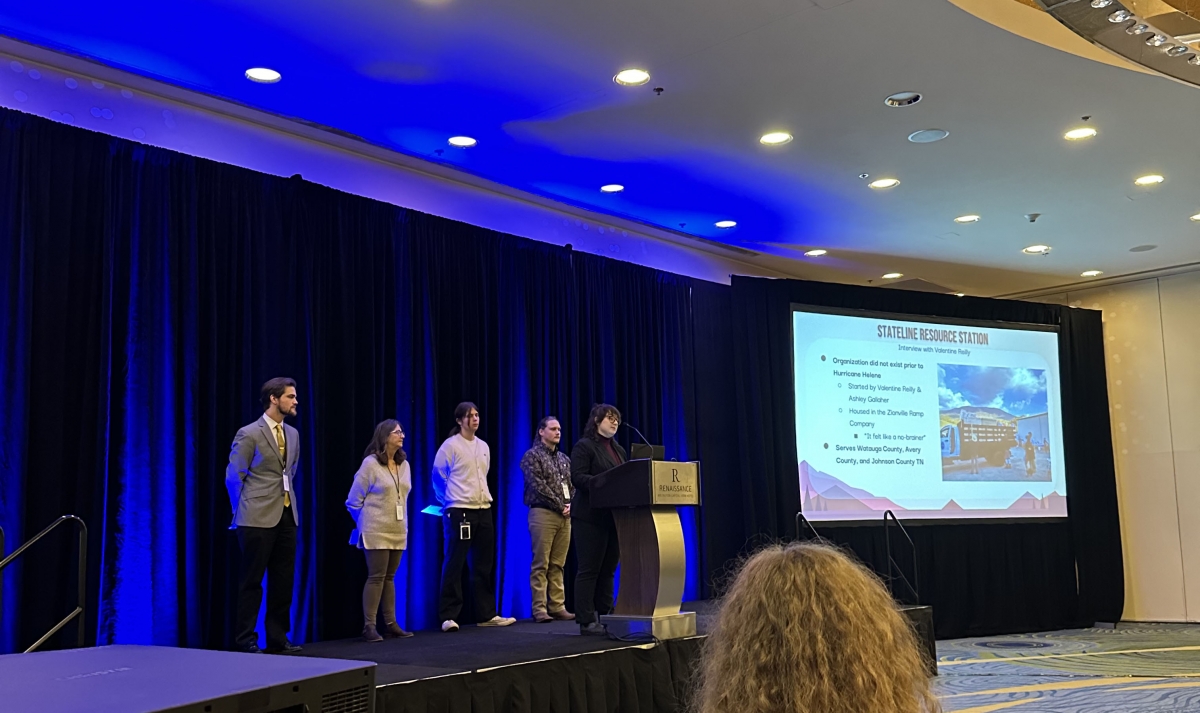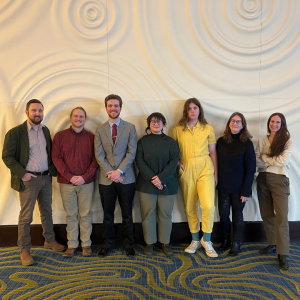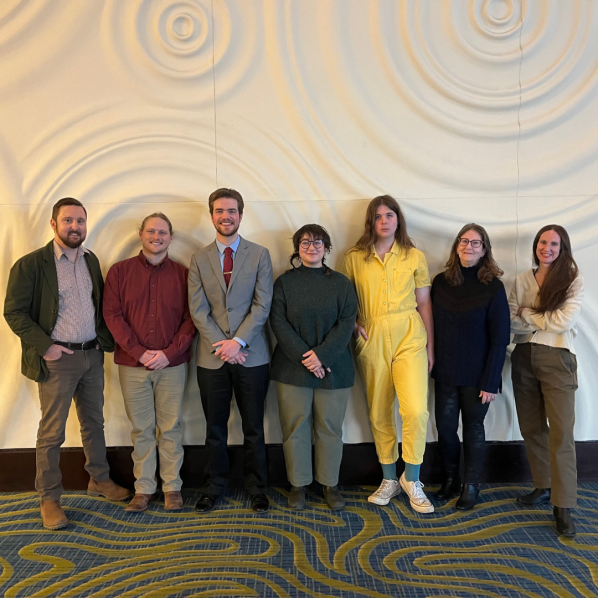BOONE, N.C. — In Fall 2024, a group of faculty members from Appalachian State University's Beaver College of Health Sciences and College of Arts and Sciences was awarded a one-year, $8,000 grant by the Appalachian Regional Commission's Appalachian Collegiate Research Initiative (ACRI).
Administered by East Tennessee State University, ACRI is an applied research training program for Appalachian college students to support economic development initiatives for their communities. App State has been a participant in the ACRI every year since its inception in 2001.
The grant was awarded to three Appalachian State faculty members:
Trevor McKenzie, director of the Center for Appalachian Studies
Dr. Tammy Haley, chair and professor in the Department of Nursing
Dr. Julie Shepherd-Powell, professor and Appalachian studies graduate program director in the Department of Interdisciplinary Studies
The grant supports an ongoing project titled "Wake of the Flood: Cultural Arts and Heritage Organizations Response to Hurricane Helene in Western North Carolina." In Fall 2024, graduate students enrolled in McKenzie's "Local Music Traditions" course were preparing to conduct a study on the community impacts of events and programs hosted by community partner Mountain Home Music, a local non-profit that celebrated its 30th year of traditional music programming in 2024. However, following the devastation of Hurricane Helene in late September, the focus of the project shifted to cover the impact of regional arts and music organizations more broadly.
The project's scope expanded to explore events hosted by not only Mountain Home Music, but other community-based cultural heritage organizations who transferred their resources to serve community needs post-Helene. Students conducted interviews with event producers and site coordinators at Carolina Ramble Productions (Avery/Watauga County), Lost Province Center for the Cultural Arts (Ashe County) and the ZRC Stateline Resource Center (Avery/Watauga County and Johnson City, TN).
The results combined interviews with regional arts and music stakeholders, who are using their creativity and platforms to channel funds and supplies to their neighbors, with data showing the positive impact of these non-profits as they expanded their missions in the wake of Hurricane Helene. The students emphasized how programming sponsored by these organizations offers community members an opportunity to gather together and give back, providing relief during a challenging time.
"Just as our original project outlined how music could be an economic driver for our communities, this current iteration of the project examines how music has been, and continues to be, a way forward for our recovery efforts," explained Becks Lipshultz '24, a graduate student in the Appalachian studies program. "Not only does music fundraising allow for financial rebuilding, but also a way for our community to gather and find moments of levity. Music is an integral part of Appalachian culture, and to the same effect, music is an integral part of the ways our community is rebuilding. Organizations that did music events before, and organizations that were created because of the hurricane have embraced music as a form of resilience."

Students (left to right) Mason Smith, Janet Johnson, Lucy Coleman, Jarrett Blair and Becks Lipshultz present at the Appalachian Collegiate Research Initiative Conference in Washington, DC, on December 7, 2024. Photo submitted.
The students presented the results at the ACRI Conference in Washington, DC, on December 7, 2024. Describing the experience, Mason Smith '24, a graduate student in the Appalachian studies program, remarked, "At ACRI, our group had a unique opportunity to be the only group discussing the impact of - and recovery from - Hurricane Helene. We were told by multiple faculty members and students from the other universities in attendance that not only was the presentation itself excellent, but that the topic and the anecdotes provided by those we interviewed brought them to tears."
"Our group was also able to be one of a handful to depart from purely economic development projects. While those were often incredibly interesting, and of course vital to Appalachia's economic well-being, we were able to bring a bit of the humanities to the ACRI," added Smith. "That was a privilege in itself."
Smith shared that, following the presentation, a faculty member at the Indiana University of Pennsylvania approached the team about reprising their presentation for one of her courses and helping her develop a similar project at their university, demonstrating the far-reaching impact of the team's work.
When asked about the future directions for the project, McKenzie shared, "Our proposal for 2025-26 continues our focus on long-term regional recovery and resilience, studying the stream revitalization efforts in the New River watershed being undertaken by our community partner, MountainTrue."
"It is easy to become overwhelmed with the devastation, to lose sight of the bigger picture, but the ways that we have come together provide not only a way forward, but hope for the future of our home," said Lipschultz. "As the effects of climate change make their way into our mountains, we will see a growing number of catastrophic weather and flood events...it is crucial that one of our region’s richest resources—music—is included in strategies for coping with the climate crisis.”
###
About the Center for Appalachian Studies
The Center for Appalachian Studies promotes public programs, community collaboration, civic engagement and scholarship on the Appalachian region. The center is committed to building healthy communities and deepening knowledge of Appalachia’s past, present and future through community-based research and engagement. Learn more at appcenter.appstate.edu.
About the Department of Interdisciplinary Studies
The Department of Interdisciplinary Studies offers graduate and undergraduate degrees in four program areas: Appalachian studies; gender, women’s and sexuality studies; global studies; and interdisciplinary studies. The department is also home to Watauga Residential College, an interdisciplinary, alternative general education program. The department promotes creative and imaginative engagement through a cross-disciplinary investigation of complex systems and problems. Learn more at interdisciplinary.appstate.edu.
By Lauren Gibbs
April 30, 2025
BOONE, N.C.

